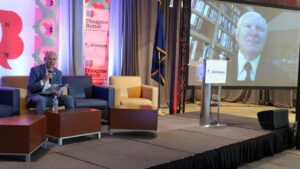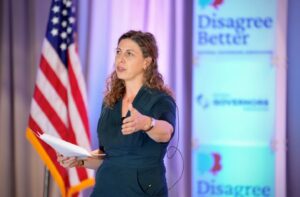Americans are all too familiar with the impact of toxic polarization in settings from home to work to Congress. Whether it’s tense conversations at the dinner table or gridlock on Capitol Hill, the political divide is hard to escape.
But experts say the consequences of political acrimony don’t stop at our shores; there are global implications, too – and they affect America’s national security, international leadership – even the future of our democracy.
At a Disagree Better convening in New Hampshire, former Defense Secretary Robert Gates joined NGA Chair Utah Governor Spencer Cox in a fireside chat to explore the geopolitical angle of toxic polarization in America.

Drawing on his experience serving eight presidents – including serving as Secretary of Defense under both the Bush and Obama administrations – Gates explained how partisan politics impacts America’s global leadership.
“We have always had polarized politics in this country. The question is, what’s different? I think the key is the fact that the polarization has led to paralysis.”
“We have not had a Defense Appropriations Bill passed by the Congress before the start of the fiscal year since 2010,” Gates continued. “We have the current impasse over the confirmation of senior military officials, which is having a devastating effect inside the military. It’s this paralysis at a time when we face very aggressive foreign adversaries, such as Russia and China, who are now working together more closely, probably, than ever in their history. That presents some real challenges for us, and we can’t even get a defense budget passed.”
In addition to budget uncertainty, Gates pointed to Congress’ habit of passing policies on such a lopsided partisan basis that it “calls into question the sustainability of that policy after there’s a change in leadership in the White House or in the Congress itself.”
“One of the ways we prevailed in the Cold War was, we had a consistent policy [and] strategy under nine successive presidents of both parties,” Gates explained. “It’s hard to imagine coming up with that now.”
Governor Cox relayed a recent conversation between Governors and Swiss Ambassador Jacques Pitteloud, who expressed concern that U.S. allies fear they can no longer rely on the United States as the world’s leading defender of freedom.
“He talked glowingly about U.S. leadership on the international stage throughout the last century,” Governor Cox recounted. “How at every turn, when the world was in danger, they looked to the United States for leadership. And then he expressed a concern that … they could no longer do that because we were so polarized at home fighting over things that didn’t matter, and there is a vacuum there for leadership across the globe. With these dark clouds on the horizon, there’s no one stepping in to fill that void.”
Secretary Gates shared the concern, stating, “Who is going to pick up that mantle of leadership in terms of organizing the West, organizing the democracies, if it’s not the United States? If we’re not willing to pick that up, then the world, I think, is in a pretty difficult spot right now.”
Recalling American unity in the aftermath of 9/11, Governor Cox asked how, absent a national crisis, Americans could come overcome divisions.
“I think that this starts with political leaders – whether it’s at the state level, the local level or at the national level,” Secretary Gates responded. “The only way absent a disaster, or a war, or something like that, frankly, is for political leaders to set an example for the rest of Americans – that of civility, of dealing respectfully with one another, of being willing to disagree but, as your title says, ‘disagree better’ in terms of having respect for the other person.”
“Stop this business of calling the person you disagree with your enemy, or somebody who’s out to destroy America,” Gates emphasized. “Set a standard.”
Keynote speaker Rachel Kleinfeld also called on political leaders to work for change.

As a senior fellow at the Carnegie Endowment for International Peace and the founding CEO of the Truman National Security Project, Kleinfeld advises governments, philanthropists, and activists on how democracies make major social change – with a particular focus on improving troubled democracies.
In that context, she offered a sobering assessment of the fraying of American democracy.
“Our democratic system is so old that a lot of things that we assume are laws are, in fact, just habits and norms,” Kleinfeld explained. “Norms can be stronger than laws. But when they break, it’s much harder to reestablish them … And a disintegration of norms is what America has been facing for the last 15 years.”
Kleinfeld listed a host of nonpartisan international organizations who have classified the United States as a “backsliding democracy.” According to the categorization of one organization, Freedom House, the United States “is on one of the fastest downward trajectories of any country in the world over the last few years.”
“We’re now rated between Romania and Croatia in our democratic system,” Kleinfeld said.
The decline in trust is not just theoretical, Kleinfeld stressed. It can be measured in real-world impacts, such as the rise of violent threats against elected officials. Since 2016, threats against members of Congress have increased tenfold, and threats against federal judges have almost doubled. Additionally, 15% of local elected officials – like school board members and county commissioners – were on the receiving end of threats last year. More than half of local officials who got threats are considering leaving public service.
“That’s where we are right now, as a country,” Kleinfeld stated. “Who runs for office under conditions like these? Who’s going to uphold our democracy? You know that it should take moral courage to be [an elected official.] But it really shouldn’t take physical courage … And yet that’s now what we’re asking of our school board members.”
Polarization does not always lead to the degradation of democracy, but the challenge for the U.S. is we have reached what experts term “pernicious polarization,” which is defined as polarization deployed as a political strategy.
“When polarization becomes a winning political strategy, democracies fail,” Kleinfeld warned – pointing to analysis of democracies around the globe dating back to 1950.
Accordingly, “when polarization becomes a political strategy, it takes politicians to unravel it.”
Kleinfeld offered three strategies Governors can exercise in their capacity as role models:
- Make violence abnormal, including in jokes: “Jokes have this way of getting around our rational thoughts; things that you wouldn’t accept in your regular discourse, people laugh at. So violence has to be abnormal in jokes, in memes and implicit suggestions in postcards of your family at Christmas.”
- Don’t hate the other side: “People need to understand that to be members of your party in good standing, they don’t actually have to hate the other side. You have to give them permission to have strong ideological beliefs without hate. That’s what these beautiful ads are doing that Governors are making … Remind people that they have a shared identity.”
- Return to the idea that one side does not pose an existential threat to democracy: “The other side are not our existential enemies. They’re just people with whom we disagree, sometimes strongly.”
Kleinfeld closed her remarks by recognizing the unique ability of Governors to inspire change:
“You will find that it takes courage, but it also is an incredible reward – because it means that the country can move forward and get stuff done … If we do those things, there is no one who has more power than our nation’s Governors to change the direction of our country.
“And we need that change in direction.”












